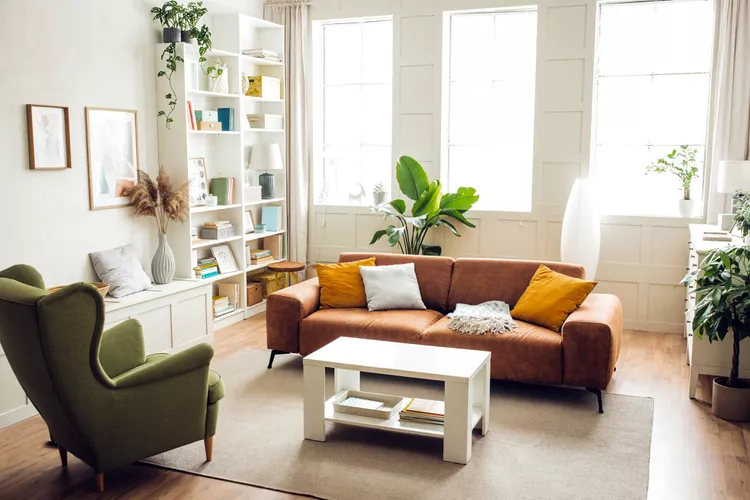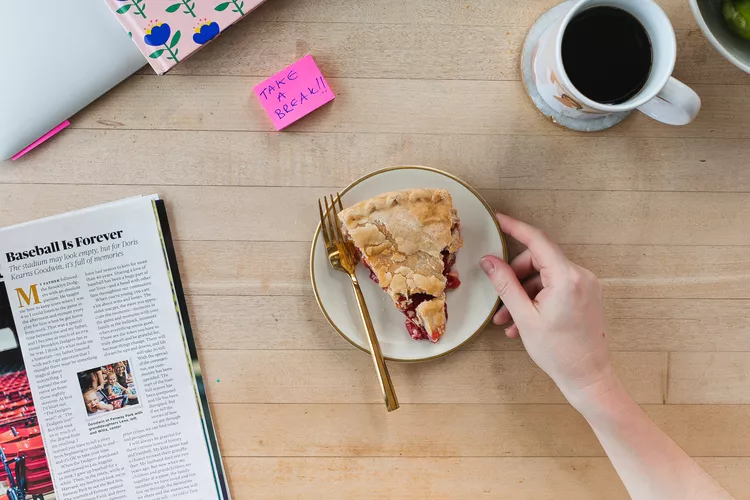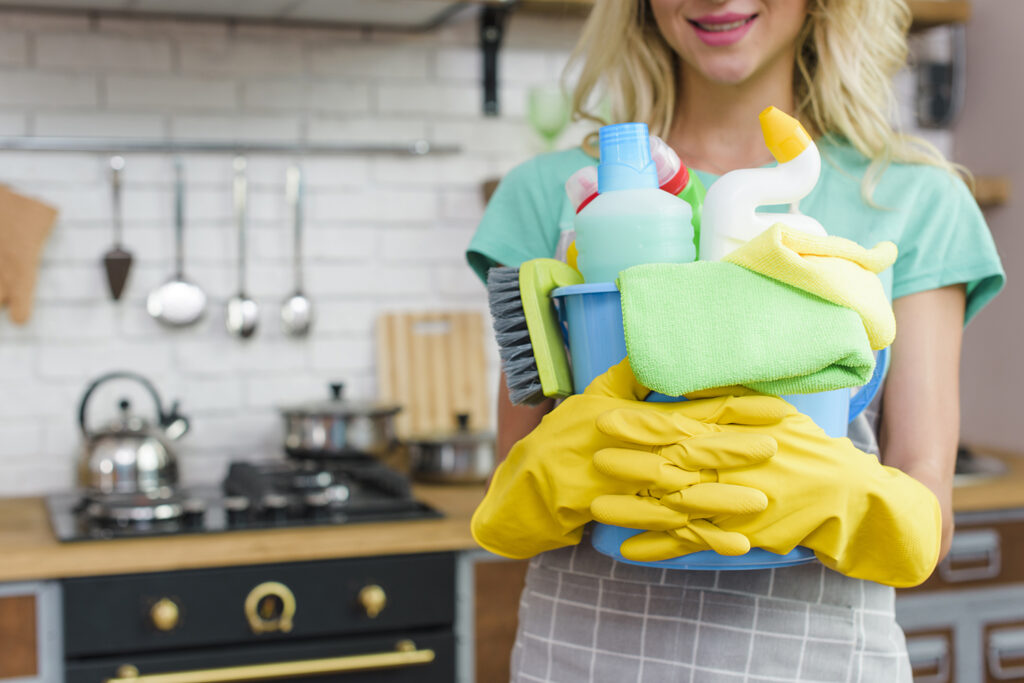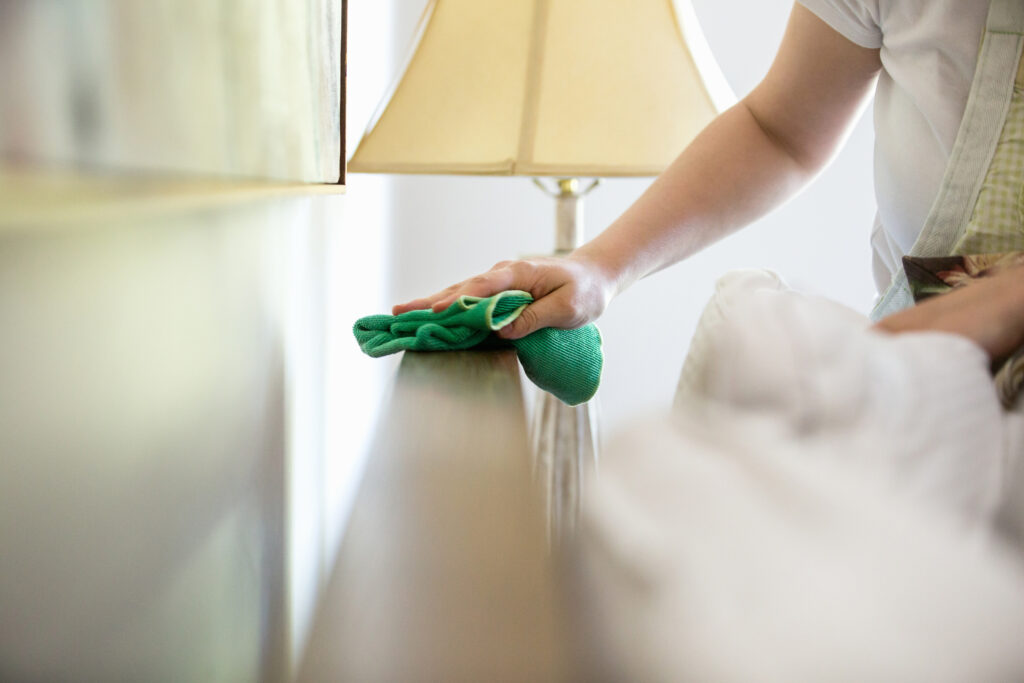Most of us boast about how tidy we like to keep our homes. The cleaning drills that we employ to get rid of grime and gunk quickly become icebreakers at parties. How would the host clean up the mess after the fact? Shouldn’t they have asked us to take our shoes off at the door? All good enough points for concerned gossipers because in the 21st century, hygiene isn’t an afterthought anymore. When you step into a truly clean home, there’s an almost immediate sense of calm. The air feels lighter, the surfaces sparkle, and everything seems to have its place. What’s interesting is that these homes don’t always belong to people with unlimited free time, professional cleaners, or minimalist lifestyles. More often than not, they belong to people who have developed small, consistent habits that keep mess from ever getting out of control.
Keeping a home clean isn’t about obsessively scrubbing every corner or spending your weekends buried in chores. It’s about adopting simple daily behaviors that, over time, create an environment where clutter doesn’t build up, dust doesn’t accumulate, and cleaning doesn’t feel like an overwhelming project.
In fact, many homeowners on forums like Reddit’s r/CleaningTips or lifestyle communities on Quora often admit that their homes look “guest-ready” not because they clean more than others, but because they clean smarter. They’ve built routines that run almost automatically — wiping down counters right after cooking, putting laundry away immediately, or never leaving dishes in the sink overnight. These may sound like small things, but they have a proven record of creating a ripple effect. Once you remove the daily friction of dealing with clutter or grime, your home starts to feel lighter and more manageable. And the best part? Anyone can build these habits. You don’t need to be naturally tidy or own the latest gadgets; you just need to start with a few simple routines and stick to them.
In this article, we’ll explore five key habits that people with consistently clean homes swear by. These aren’t unrealistic or overly time-consuming tasks — they’re small, repeatable actions that make all the difference. By the end, you’ll see that keeping a spotless home isn’t about working harder; it’s about working smarter, and these habits are the proof.
Habit 1: They Never Leave Messes for Later

One of the biggest differences between people with clean homes and those who constantly feel overwhelmed by clutter is timing. People with clean homes don’t let small messes linger; they deal with them right away. It may sound a bit OCD-ish and somewhat comical to imagine, we get it, but this habit is transformative.
Think about dishes in the sink. Leaving them “for later” almost always means the pile grows larger, food hardens, and the task feels ten times harder the next morning. People with clean homes tackle it immediately — rinsing plates and loading the dishwasher after each meal. It only takes a few minutes in the moment, but it saves hours of scrubbing down the line. Yes, they don’t care if the guests are ignored for ten minutes.
The same goes for small spills or accidents. A homeowner on Reddit’s r/CleaningTips shared: “I used to leave little spills on the counter until my weekend deep clean. Now I wipe them the second they happen, and suddenly my kitchen feels permanently cleaner.” Acting immediately not only keeps surfaces spotless but also prevents stains, stickiness, or lingering odors. If they tell you, you’re a maniac, throw them out and clean yourself of demotivators!
Clutter follows the same rule. People with clean homes tend to live by the “one-touch rule”: instead of setting mail on the table to sort later, they open it immediately, recycle what’s unnecessary, and file the rest. Instead of dropping jackets on a chair, they hang them in the closet. By dealing with things in the moment, clutter never has a chance to build into a bigger mess. This habit also extends to pets and kids. Dog owners often wipe muddy paws at the door instead of waiting until paw prints are tracked all over the house. Parents encourage kids to put toys back in bins as soon as playtime ends. These little steps prevent bigger, more time-consuming cleanups later.
Let’s bring in some science as well. Psychologists even point out that immediate action reduces mental stress. When your environment is clean, your brain doesn’t register “unfinished chores” everywhere you look. As one Quora user wrote: “I used to feel anxious seeing clutter on counters. Once I started handling things right away, my stress levels dropped along with the mess.”
At its core, this habit is about shifting your mindset from postponing to preventing. People with clean homes don’t spend more time cleaning; they spend less. But they make their minutes count by handling the little things instantly, keeping their spaces neat almost effortlessly. And oh, they don’t care about those judgmental looks anyone throws at them.
Habit 2: They Have a Place for Everything

If there’s one thing that makes a home look instantly messy, it’s clutter that doesn’t have a home of its own. You saw the right, clutter is a noisy teenager demanding its own space! Shoes by the door, mail on the counter, keys tossed onto random surfaces — these small items add up quickly and create the sense of disorganization, even if the rest of the house is clean. People with consistently clean homes avoid this problem by giving everything a designated spot. This doesn’t mean you need to invest in expensive storage solutions or redesign your home. It’s about creating logical, convenient “homes” for your belongings so that putting things away becomes second nature. For example, a basket by the entryway for shoes, a tray on the counter for keys and wallets, or labeled bins in the pantry for snacks. Once items have an obvious home, clutter has nowhere to collect. Your items do not need to legally change their name to clutter if you manage it right.
Many homeowners on Reddit’s r/Organized community mention that once they assigned places for commonly misplaced items — like remote controls, chargers, or mail — their homes stayed tidier without extra effort. One user wrote: “I realized I wasn’t lazy; I just didn’t have set places for things. Once I fixed that, my house started cleaning itself.”
The ‘where did you put the remote’ argument is a common problem. By simply assigning places to your effects helps reduce arguments in shared households. Families often struggle with misplaced items simply because there’s no system. A “drop zone” for backpacks, dog leashes, or shopping bags eliminates the daily chaos of searching for things. Parents of young children often find that toy bins in living areas keep floors clear without requiring constant nagging. Storage doesn’t have to be hidden to be effective, either. Decorative baskets, open shelving, or wall hooks can serve as both organization and design elements. The key is making it easier to put something away than to leave it out. If a jacket can go on a hook by the door in two seconds, it won’t end up draped over a chair.
The psychological benefit is just as important as the visual one. A Quora user explained: “Before, every flat surface was a dumping ground. Once I gave everything a place, my home felt calmer, and I felt more in control.” Clean homes don’t magically stay clean; they’re maintained by these simple systems that prevent clutter from ever taking root. In essence, the difference between order and chaos is often just whether or not your belongings have a home. People with clean houses don’t spend hours tidying up; they spend seconds putting things back where they belong. Over time, those seconds add up to a space that feels consistently clear, calm, and clutter-free.
Habit 3: They Stick to Small Daily Routines

People with consistently clean homes don’t rely on marathon weekend cleaning sessions. They don’t roll up their sleeves and cancel all of their appointments because the day for clutter to die is here. Instead, they build small routines into their everyday life that prevent dirt and clutter from snowballing. These routines are short, manageable, and often take less than 10 minutes, but the results compound over time.
One of the most common routines is the 10-minute tidy. Before going to bed, many homeowners spend a few minutes putting things back in their place: folding blankets on the couch, loading the dishwasher, or clearing counters. On Reddit’s r/CleaningTips, a user shared: “My house never feels overwhelming anymore because I do a quick reset every night. It takes me less time than scrolling on my phone, and I wake up to a calm space.”
Another popular routine is the “clean as you go” method. This is especially effective in the kitchen, where mess can escalate quickly. People with clean homes don’t wait until after cooking to face a mountain of dishes; they rinse utensils and wipe counters as they cook. By the time the meal is ready, the kitchen is already halfway clean. No magic wands needed here, only simple planning.
Laundry is another area where routines make or break cleanliness. Instead of letting clothes pile up until the weekend, many tidy homeowners wash and fold smaller loads more frequently. It feels less overwhelming, and clean clothes are always available. Parents on Quora often recommend a simple rule: one load a day. “It’s easier to fold one basket each evening than seven on Saturday,” one mom explained.
The same method can be applied to your bathroom routine. Daily bathroom habits play a significant role. A quick wipe of the sink after brushing teeth or spraying the shower with a daily cleaner prevents grime buildup. These micro-cleaning habits take seconds but eliminate the need for hours of scrubbing later.
What makes these routines so powerful is that they become automatic. People with clean homes don’t debate whether to clean; they do it as part of their daily rhythm. Over time, these actions stop feeling like chores and start feeling like part of normal living. More like a soundtrack to life.
Ultimately, sticking to small daily routines is less about discipline and more about mindset. Instead of thinking, “I’ll clean it all later,” tidy homeowners think, “I’ll spend two minutes on it now.” That shift keeps their homes consistently fresh, manageable, and guest-ready without ever requiring massive effort.
Habit 4: They Declutter Regularly

A key difference between people with clean homes and those who constantly struggle with tidiness is how they handle clutter. Clean homes aren’t necessarily spotless because the owners are obsessed with cleaning (really? Yes!) — They stay clean because there’s simply less stuff to manage.
People who keep tidy homes regularly evaluate their belongings and let go of what they no longer need. Instead of waiting for spring cleaning or moving day, they build decluttering into their routine. That might mean sorting through mail once a week, checking closets every season, or doing a quick “five-item purge” whenever a drawer starts to feel crowded.
One Reddit user on r/Declutter explained: “I realized my problem wasn’t cleaning, it was owning too much. Once I got rid of the extras, my house became so much easier to maintain.” This mindset shift is powerful — cleaning feels lighter when every item in your home has a purpose and a place.
A common tactic is the one in, one out rule: whenever something new comes into the home (like clothes, gadgets, or kitchenware), an old item leaves. This keeps belongings from multiplying beyond what storage can handle. Many tidy homeowners also swear by donation bins placed in closets or entryways. Whenever they come across something they don’t use, it goes straight in the bin, no second-guessing. Also, don’t act like Penny from The Big Bang Theory and end up at the charity to claim your giveaways back!
Decluttering also applies to your presence in digital spaces. Mail piling up on the kitchen counter often comes from subscriptions, flyers, and junk you don’t even need. Clean-home people cancel unwanted subscriptions and opt for paperless billing to prevent clutter from entering in the first place.
Parents and pet owners benefit especially from this habit. Toy baskets and pet accessories can quickly overflow. Families who maintain clean homes often rotate toys — keeping a small selection out and storing the rest, swapping every few weeks. This reduces mess and keeps kids and pets interested in their things.
What stands out is that decluttering isn’t a once-a-year purge; it’s a steady practice. Clean-home people don’t allow “stuff creep” to take over. By regularly removing the unnecessary, they prevent clutter before it becomes overwhelming.
The result? A home that feels lighter, easier to clean, and far more peaceful. As one Quora user put it: “The less I own, the faster I clean, and the calmer I feel.” Decluttering isn’t just about keeping up appearances; it’s about creating a space that feels open, manageable, and stress-free.
Habit 5: They Maintain Cleaning Systems That Work

People with consistently clean homes don’t rely on random bursts of energy to tackle chores. Instead, they think systematically and build systems — routines, schedules, and shortcuts that keep their homes tidy with minimal effort. These systems aren’t complicated; they’re simple structures that make cleaning predictable and manageable.
One of the most common systems is the zone cleaning method. Instead of trying to clean the entire house at once, tidy homeowners break tasks into smaller sections. For example: Mondays for bathrooms, Tuesdays for vacuuming, Wednesdays for laundry. This spreads the workload evenly and prevents cleaning from becoming overwhelming. A user on Reddit’s r/CleaningTips shared: “Once I assigned days for each task, I stopped procrastinating. I never feel behind because I always know today’s focus.”
Another system is the “reset rule.” People with clean homes often set small anchor points in their day — like resetting the kitchen after dinner or doing a five-minute bathroom check before bed. These mini-routines act as checkpoints, ensuring no mess ever spirals out of control.
Tools also play a role in these systems. Many tidy homeowners keep cleaning supplies where they’re needed most: disinfectant wipes in the bathroom, a small vacuum near the living room, or a basket of microfiber cloths in the kitchen. This makes cleaning almost automatic because the tools are always within reach.
Families often use shared systems. For example, kids have chore charts, or each family member takes responsibility for one zone. Couples might agree that one handles dishes while the other vacuums. These small agreements keep homes cleaner without one person feeling overwhelmed. We all know that sharing is caring.
Digital tools help too. Some people use reminders on their phones or cleaning apps that gamify chores. Others follow simple guides like the popular FlyLady routine, which emphasizes daily “hot spot” decluttering and weekly cleaning missions. The point isn’t which system you use, but that you use one consistently.
The beauty of these systems is that they make cleanliness sustainable. Instead of tackling huge messes in stressful bursts, tidy homeowners handle smaller tasks on autopilot. Over time, this turns into a rhythm that keeps the home looking and feeling organized almost effortlessly.
As one Quora user explained: “My house doesn’t stay clean because I clean more; it stays clean because I clean smarter.” Systems take the guesswork out of housework, and that’s why they’re the quiet secret behind every consistently tidy home.
Products & Shortcuts That Keep Homes Clean (Even If You’re Busy or “Lazy”)

We know, we know. Even after all of the optimism, not everyone has the time, energy, or motivation to stick to long cleaning routines. Many people work long hours, come home late, or simply hate cleaning. But there’s good news. Technology and smart tools can do a lot of the heavy lifting for you. Here are some highly recommended products and lazy-friendly hacks that help keep homes clean with minimal effort.
- Robot Vacuums (Your Daily Floor Helper)
If you do nothing else, let a robot vacuum run while you’re out. Models like the iRobot Roomba j7+ or Roborock Q7 Max are lifesavers for pet owners or busy professionals. They pick up dust, crumbs, and fur every day without you lifting a finger. Many have self-emptying bases, meaning you only deal with them once every couple of weeks.
Lazy tip: Set it on a schedule — your floors will stay clean even if you never touch a vacuum again. - Cordless Stick Vacuums
For quick cleanups, a cordless vacuum like the Dyson V15 Detect or Shark Stratos Cordless is unbeatable. They’re lightweight, easy to grab, and don’t make vacuuming feel like a workout. Perfect for people who want a 5-minute solution after work. - Steam Mops & Spray Mops
Mopping feels like a big task, but steam mops (like the Bissell PowerFresh) or spray mops (like O-Cedar ProMist Max) make it fast and effortless. Steam sanitizes floors without chemicals, while spray mops let you clean small messes in seconds.
Lazy tip: Keep one mop in the kitchen or near the entryway so you don’t procrastinate. - Automatic Litter Boxes (for Cat Owners)
If scooping litter daily feels impossible, products like the Litter-Robot 4 or PetSafe ScoopFree automatic litter boxes handle the dirty work. They self-clean after each use and only need emptying every 1–2 weeks. - Dishwasher-Safe Everything
People with clean homes simplify laundry and dish duty by choosing dishwasher-safe and machine-washable items. From pet bowls to microfiber cloths to reusable water bottles, this shortcut saves hours over time. - Air Purifiers
If you come home late and don’t have time to deep clean, an air purifier with a HEPA + carbon filter (like the Levoit Core 400S or Honeywell HPA300) keeps your air fresh and removes odors automatically.
Lazy tip: Pair with a plug-in air freshener to make your home smell guest-ready instantly. - Catch-All Baskets & Hidden Storage
Decorative baskets, ottomans with storage, or even under-bed bins allow you to “clean up” in minutes by tossing things out of sight. While not a permanent solution, it keeps homes looking neat for guests without much effort. - Subscription Cleaning Services (Ultimate Lazy Hack)
For people who travel often or work late nights, hiring a cleaning service once or twice a month is worth it. Apps like TaskRabbit or Handy make it easy to book someone quickly for a reset.
Lazy-Person Shortcut Summary
- Robot vacuum daily → no sweeping.
- One-load laundry rule → wash small loads, don’t let them pile.
- “Drop zone” baskets → for shoes, mail, or random clutter.
- Clean as you go, but minimally → rinse dishes instead of scrubbing later.
- Automate odors → air purifier + plug-in diffuser.
These products and shortcuts prove that you don’t need to be a cleaning enthusiast (and can be downright lazy) to have a tidy home. Whether you’re exhausted after long days or simply want a low-effort lifestyle, small investments in the right tools will keep your home looking and feeling fresh with almost no effort.
| Task Type | What to Do (Easy Version) | Tools / Shortcuts |
| Daily – 5 mins | Wipe counters, rinse dishes, and quickly vacuum main area | Cordless vacuum, microfiber cloths |
| After Cooking | Wash pans right away, wipe the stove | Spray cleaner, paper towels / reusable wipes |
| After Walks (Pets) | Wipe paws before entering | Pet wipes, microfiber cloth |
| Night Reset – 10 mins | Put away clutter, fold blankets, and load the dishwasher | Basket for clutter, dishwasher |
| Weekly – 30–60 mins | Vacuum upholstery, mop floors, and wash bedding | Steam mop, pet-hair vacuum, washer/dryer |
| Declutter Habit | Sort mail instantly, toss 1–2 unused items weekly | Small recycle bin, donation basket |
| Odor Control | Open windows for 10 mins, sprinkle baking soda on the carpet | Air purifier, enzyme cleaner |
| Laundry System | One small load every 2–3 days | Washing machine, folding basket |
| Lazy Hack | Let the robot vacuum run daily, keep baskets for quick hiding of clutter | Roomba, decorative storage baskets |
Step-by-Step Routine
- Morning (5 mins): Open windows, quick sweep/vacuum main area.
- After Meals (5 mins): Rinse dishes, wipe counters.
- Evening Reset (10 mins): Clear clutter, fold blankets, load dishwasher.
- Weekly Reset (30–60 mins): Wash pet bedding, mop floors, vacuum upholstery, scrub bathroom.
- Declutter Check (5 mins): Toss/recycle items you don’t use anymore.
- Automate Where Possible: Robot vacuum, automatic litter box, air purifier.
Conclusion
So what did we learn, my lazy friend? Here’s the lesson: A clean home isn’t about scrubbing endlessly or spending entire weekends tackling chores. The real secret lies in small, consistent habits. People with tidy homes don’t necessarily clean more often; they clean smarter. They deal with messes right away, give every item a place, stick to small daily routines, declutter regularly, and rely on simple systems that keep everything manageable.
These habits aren’t about perfection; they’re about prevention. By wiping counters after cooking, putting laundry away immediately, or taking just 10 minutes before bed to reset the house, you avoid the stress of facing overwhelming messes later. The beauty of these routines is that they don’t demand hours of energy; they take minutes but create long-lasting calm.
Another important takeaway is that clean homes aren’t always spotless or magazine-perfect. They’re lived in, filled with real life, and sometimes a little messy, but because of these habits, they never spiral into chaos. Even for busy or “lazy” people such as yourself (why else would you be here?), the right tools and shortcuts, like robot vacuums, automatic litter boxes, and catch-all baskets, make it possible to maintain a clean home without much effort.
Ultimately, the difference between a home that feels cluttered and one that feels peaceful comes down to mindset. People with clean homes don’t put things off; they prevent problems before they start. And anyone can adopt these habits. You don’t need expensive products, hours of free time, or a natural love for cleaning. You just need a willingness to make small, consistent choices that add up.
Because at the end of the day, a clean home isn’t just about appearances, it’s about creating a space where you can relax, recharge, and feel proud of your surroundings. And that’s kind of something worth building habits for.


